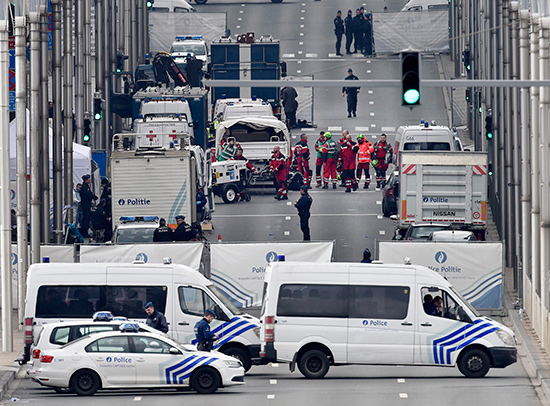University Urges Students Abroad to Avoid Brussels
No formal BU programs were in the city attacked by terrorists

Police and rescue teams outside the Maelbeek metro station in Brussels on Tuesday. Two explosions, the work of terrorists, rocked Brussels Airport and the city’s subway system, killing at least 34 and prompting a lockdown of the Belgian capital and heightened security across Europe. AP Photo/Martin Meissner
Updated March 23 at 12:07 p.m.: The State Department advises Americans traveling to or in Europe to be extra vigilant when in public areas or while using mass transit. Read the full alert here.
Although Boston University has no Study Abroad programs currently in Brussels, it is advising students studying elsewhere in Europe to avoid Belgium’s capital following Tuesday’s terrorist attacks that killed 31 and injured 300. The city’s airport and the subway system are temporarily closed.
The University is not aware of any students or staff injured in the attacks. Two Terriers from another BU Study Abroad program visiting Brussels on spring break are reported safe and have been advised to shelter in place there.
“We recommend strongly that students defer planned travel to Brussels, or any travel that would take them through the Brussels airport or train station,” wrote Joseph Finkhouse, associate director of health, safety, and security for BU’s Global Programs, in a letter to Study Abroad site directors and students Tuesday morning. “At the very least, European travel will be a mess for the next several days, and security will be at a very high level, with many delays and much obtrusive security and police action. Travelers should reconsider the necessity of travel for the next week or so.”
Noting that the US State Department has asked Americans in Brussels to shelter in place, Finkhouse advised site directors to meet with students if possible to discuss the attacks and reasonable precautions, informed by European authorities; tell students “to practice heightened vigilance, especially in transportation centers and near government and diplomatic facilities”; and try to reassure students that there is no need for panic.
In a separate letter to all BU students in Europe, Kenneth Elmore (SED’87), associate provost and dean of students, and Study Abroad executive director Gareth McFeely advised students to keep their program’s emergency contact and international student health insurance information with them while traveling.
A dozen students have enrolled in a scheduled summer Study Abroad program in Brussels. “We don’t have any changes in mind at the moment” for that program, but “this is a very fluid situation,” Finkhouse says.
Individual counseling support for students, faculty, and staff, on campus or abroad, can be arranged at any time through the following resources:
- Marsh Chapel chaplains can be reached at 617-353-3560.
- Behavioral Medicine providers at Student Health Services can be reached at 617-353-3569.
- Sexual Assault Response & Prevention Center (SARP) counselors can be reached at 617-353-SARP (7277).
- Counseling is also available for faculty and staff through the Faculty & Staff Assistance Office, 617-353-5381.
The Islamic State (ISIS) has claimed responsibility for the airport and subway attacks, which followed by four days the arrest of Salah Abdeslam, the last surviving suspect in the November 13 Paris attacks by the Islamic State that left 130 dead.

Comments & Discussion
Boston University moderates comments to facilitate an informed, substantive, civil conversation. Abusive, profane, self-promotional, misleading, incoherent or off-topic comments will be rejected. Moderators are staffed during regular business hours (EST) and can only accept comments written in English. Statistics or facts must include a citation or a link to the citation.